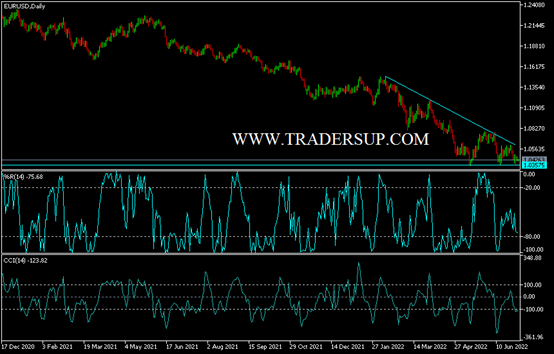The price of the EUR/USD currency pair stumbled again in a rebound higher, as the negative pressures on the euro are still strong and persistent. After attempting to rebound higher at the beginning of this week’s trading, towards the level of 1.0462, it retreated to the vicinity of the support 1.0400, and last week the price of the euro dollar fell towards the support level 1.0365. The exchange rate of the euro against the dollar has slipped again near its lowest levels in the last five years and may risk remaining under pressure near those levels in the coming days unless the US currency stumbles further in the wake of Friday’s stumble.
The single European currency, the Euro, came under pressure from the dollar’s strength early last week and approached its lowest level in five years, after Eurostat data showed mixed overall and core European inflation rates. The dollar’s erratic strength was an important driver of the euro’s losses, and thus the sharp recovery late in the Friday session when the greenback suffered a setback following the release of the ISM manufacturing PMI for June.
Many economists took Friday’s negative ISM PMI surprise as an indication of the ongoing US economic slowdown, a popular concept recently but which did little to help the US dollar on Friday, which fell against many currencies ahead of the weekend’s close. .
The US dollar did not benefit much last week from the ISM manufacturing survey or the Federal Reserve’s (Fed) preferred inflation measure – the core PCE price index – which stalled for June, and in the meantime, the annual rate fell from 4.9%. 4.7% all the way. Both were followed by broad losses for the dollar, although it was also quick to attract buyers from the market during the weakness, and it is now likely that much of the EUR/USD pair this week will depend on the market’s response to important events in the US calendar and to anything emerging. Especially on the ECB policy front.
The euro received no help last week when ECB President Lagarde stressed the importance of discretion regarding the timing and size of any changes in interest rates after the 0.25% hike in July that was previously announced last month. Given the prevailing uncertainty, normalization should remain gradual. Currently, our goal should be to avoid the entrenchment of high imported inflation in the near term by feeding high inflation expectations. That is why we are ending policies that sought to fend off deflationary dynamics, such as net asset purchases and negative rates, said Fabio Panetta, member of the European Central Bank’s Executive Board, on Friday.
added. Further adjustments to our monetary policy stance will depend on the evolution of inflation expectations and the economy. At this point, inflation expectations are around 2% and wage increases remain moderate. We are closely monitoring these developments. We want to see how the economy reacts to tighter financing conditions and a deteriorating global and domestic economic outlook. And with fears that the global economy has been leading markets to speculate lately on their previous assumptions about interest rates, the euro is likely to pay close attention this week when Bundeswehr chief Joachim Nagel and ECB President Lagarde appear publicly on Monday and Friday, respectively.
However, along the way, the minutes of the European Central Bank’s June meeting will expire on Thursday while a number of Fed policymakers are scheduled to speak publicly from Wednesday, which is also when the minutes of the June meeting of the FOMC are released.
Where is the EUR/USD headed?
According to the technical analysis, the general trend for the EUR/USD price is still bearish, and stability below the 1.0500 support will continue to support the bears for a further move down. At the moment, the closest support levels are 1.0380 and 1.0290, which are sufficient at the same time to push the technical indicators towards oversold levels. On the upside, and according to the performance on the daily chart, bulls break through the resistance levels 1.0645 and 1.0800 to make a breach of the current trend.


